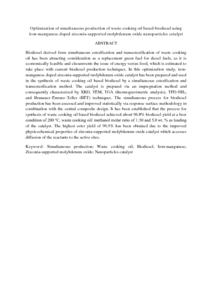Citation
Alhassan, Fatah H. and Rashid, Umer and Yun Hin, Taufiq-Yap
(2016)
Optimization of simultaneous production of waste cooking oil based-biodiesel using iron-manganese doped zirconia-supported molybdenum oxide nanopeprintss catalyst.
Journal of Renewable and Sustainable Energy, 8 (3).
pp. 1-13.
ISSN 1941-7012
Abstract
Biodiesel derived from simultaneous esterification and transesterification of waste cooking oil has been attracting consideration as a replacement green fuel for diesel fuels, as it is economically feasible and circumvents the issue of energy versus food, which is estimated to take place with current biodiesel production techniques. In this optimization study, iron-manganese doped zirconia-supported molybdenum oxide catalyst has been prepared and used in the synthesis of waste cooking oil based biodiesel by a simultaneous esterification and transesterification method. The catalyst is prepared via an impregnation method and consequently characterized by XRD, TEM, TGA (thermogravimetric analysis), TPD-NH3, and Brunauer–Emmer–Teller (BET) techniques. The simultaneous process for biodiesel production has been assessed and improved statistically via response surface methodology in combination with the central composite design. It has been established that the process for synthesis of waste cooking oil based biodiesel achieved about 96.8% biodiesel yield at a best condition of 200 °C, waste cooking oil/ methanol molar ratio of 1:30 and 5.0 wt. % as loading of the catalyst. The highest ester yield of 96.8% has been obtained due to the improved physicochemical properties of zirconia-supported molybdenum oxide catalyst which accesses diffusion of the reactants to the active sites.
Download File
![[img]](http://psasir.upm.edu.my/53453/1.hassmallThumbnailVersion/Optimization%20of%20simultaneous%20production%20of%20waste%20cooking%20oil%20based-biodiesel%20using%20iron-manganese%20doped%20zirconia-supported%20molybdenum%20oxide%20nanoparticles%20catalyst.pdf)  Preview |
|
PDF
Optimization of simultaneous production of waste cooking oil based-biodiesel using iron-manganese doped zirconia-supported molybdenum oxide nanoparticles catalyst.pdf
Download (76kB)
| Preview
|
|
Additional Metadata
Actions (login required)
 |
View Item |

